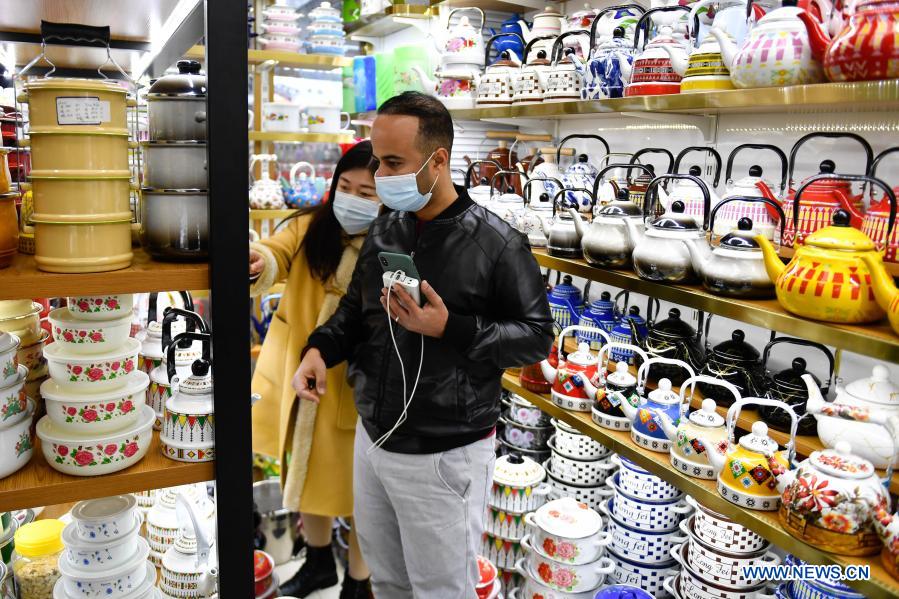Helping enterprises pull through the pandemic

With the reemergence of the novel coronavirus across the country, China's economy is under the triple pressure of demand contraction, supply shocks and weakening expectations. The service industry in particular has been severely impacted.

According to the Ministry of Finance, national general public budget revenue was 17 trillion yuan ($2.47 trillion) while expenditure reached 20 trillion yuan in the first 10 months. Among which health expenditure was more than 1.75 trillion yuan with a year-on-year increase of 12.6 percent.
As government expenditure on epidemic prevention and control and public health has continuously increased, small and medium-sized enterprises, particularly those in the service industry, hope the government can help them pull through the pandemic. How to strike a balance between epidemic prevention and control, the bail-out of enterprises, and support for people's livelihood remains a pressing challenge for the government. One which calls for systematic planning and coordination.
First, enterprises need real money to help them recover from the pandemic shock. To be more precise and effective in addressing the needs of SMEs, the government should provide real money subsidies to save those in crisis, make good use of policy tools and implement direct measures including rent reduction, tax cuts and fee reductions for small and micro businesses, which could be life-saving straws for those in need.
In 2022, SMEs in the service industry and individual businesses that rent State-owned property in the county-level administrative areas listed as high-risk areas of the epidemic have been exempted six months of rent, and those in other areas exempted three months of rent. Large-scale value-added tax refunds are the highlight of this year's new combined tax and fee support policy.
According to the State Taxation Administration, as of Nov 10, value-added tax refunds totaled over 2.3 trillion yuan, of which SMEs are the main beneficiaries, accounting for 93.1 percent of the refunded. And SMEs and enterprises in tourism, civil aviation, railways, road transportation and other industries that have been hit hard by the epidemic have received tax rebates of 917.8 billion yuan and 509.2 billion yuan respectively.
Second, enterprises need to be endowed with the skill of fishing, instead of only giving them fish, to enhance their capability, thus their immunity to shocks. Local governments should guide enterprises to make good use of various preferential policies, stimulate market players to be more proactive, so as to restore the function of enterprises in providing jobs and income.
There are bound to be opportunities in a crisis. Although the pandemic has caused some industries to fall into difficulties, it has also driven the rise of others such as smart manufacturing, unmanned distribution, online consumption and medical services.
Some regions have launched plans to promote the digital transformation of traditional manufacturing to reactivate its development momentum. For example, Shanghai plans to cover all manufacturing enterprises that have an annual main business revenue above 20 million yuan with digital diagnosis, and the proportion of digital transformation will be no less than 80 percent by 2025. Healthcare, the internet, and IT services are expected to become hotspot industries. Industries such as modern logistics, consumer services, software development, online-to-offline services, and consumer electronics are also likely to give birth to new business models or new formats.
Meanwhile the government should extend support to specialized and innovative giant enterprises, provide them with special funds, and reduce the pressure on their corporate capital turnover. Enterprises must take the initiative to transform so they are prepared to seize any opportunities that may appear.
The government should also increase social security assistance, continue to implement the phased policy of reducing unemployment insurance premium rates, ensure that enterprises keep their employees, and help enterprises recruit talents, provide college students with living and rent subsidies, and give corresponding training subsidies to enterprises that organize training to help them retain talents. All in all, the authorities should provide solid logistical support for the long-term development of enterprises, and boost their confidence.
Finally, multi-party cooperation is required to implement the related policies to realize epidemic prevention and control, enterprise bail-outs and support people's livelihoods.
Party committees and the governments should play a leading role, strengthen overall planning and coordination, do a good job of situation analysis, increase coordination and promote the introduction and implementation of relevant policies, and strengthen research on policy initiatives. Organizational departments should carry out their own responsibilities, strengthen cooperation, increase policy publicity and improve implementation, promptly introduce specific policy implementation measures, follow up and interpret the policies and measures in a timely manner, and adjust the details of the 33 national economic stabilization policies and 19 subsequent policy measures to local conditions. Difficulties and blockages in the process of policy implementation should be resolved in time, and the demands and concerns of SMEs responded to accordingly.
The coordinating department should combine the actual situation and the characteristics of industries in difficulty, introduce targeted special support policies and use technology to help improve service capabilities and ensure that policies are effectively implemented to support the development of enterprises in distress.
For instance, the Ministry of Transport and the Ministry of Industry and Information Technology have established an information sharing mechanism for truck drivers and implemented white-list management in response to the logistics problems that have affected enterprises in some areas due to the epidemic. They have optimized the traffic management and control policy of trucks, implemented closed-loop management for truck drivers and realized mutual recognition of nucleic acid test results across the country.
To cope with uncertainty and suit the remedy to the case, long-term beneficial and practical working mechanisms and multiple measures have been taken to help enterprises stay afloat during the pandemic.
All relevant industry associations should guide and help enterprises make full use of relevant relief and support measures, strengthen investigation and research, and comprehend and give feedback on industry development trends, difficult issues, enterprise demands and policy implementation.
The author is deputy director of the Department of Strategic Philosophy, the Party School of the Communist Party of China Central Committee.
The views don't necessarily represent those of China Daily.


































